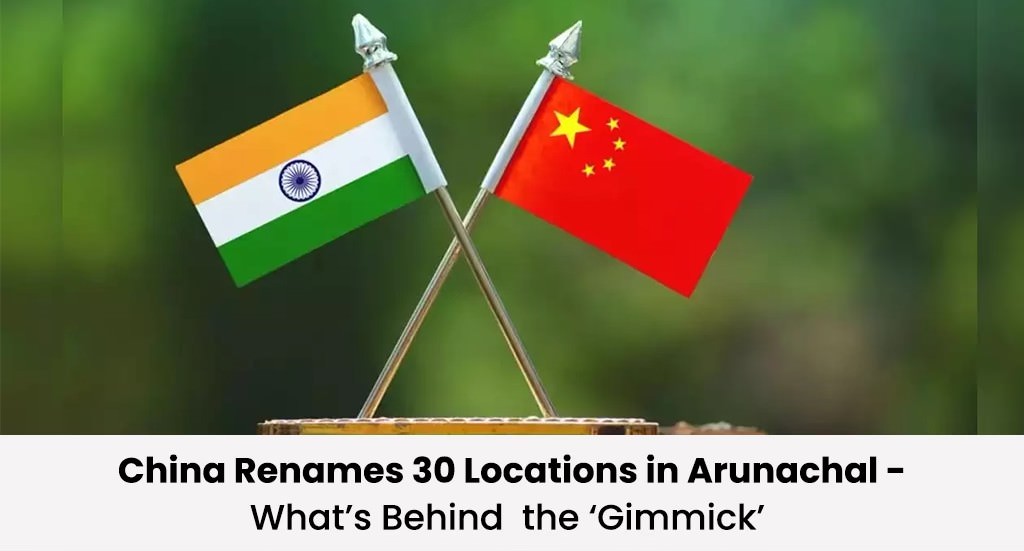China recently renamed 30 places in Arunachal Pradesh inviting strong reactions from the Indian government and Arunachal Pradesh Chief Minister Pema Khandu who dismissed the move as a “mere gimmick”. The Ministry of External affairs has rejected the move, stating that such “invented names” have no consequence on the North Eastern state which remains an integral part of India.
What’s Behind China’s Action?
The Chinese action comes soon after Prime Minister Narendra Modi inaugurated the 12-kilometer-long tunnel beneath the 13,700-feet-high Se La on March 9 from Itanagar. The Xi Jinping administration has reacted strongly.
The rapid pace at which the North East, particularly Arunachal Pradesh, has developed has been a source of concern for Beijing. The ongoing construction of the Frontier Highway spanning approximately 1,748 km from the borders of Bhutan, China, and Myanmar will serve as a significant strategic asset. This highway is poised to safeguard border areas and effectively counter China’s incremental territorial encroachments and other interventionist tactics. China understands the long- term implications of these development and integration initiatives by India and seeks to undermine these through such moves.
Initially, the Chinese government publicly protested Prime Minister Modi’s visit to Arunachal Pradesh, asserting territorial claims over the state. Subsequently, on March 30, they announced the decision to assign Mandarin names to 30 places in Arunachal Pradesh, further highlighting their stance on the issue.
The Ministry of External Affairs (MEA) categorically rejected China’s attempts to rename places in Arunachal Pradesh, asserting that assigning “invented names” will not change the fact that the state “is, has been, and will always be” an integral and inalienable part of India. The MEA issued this statement in response to media queries following China’s release of a fourth list containing 30 new names for various places in Arunachal Pradesh. This move by China comes amidst its intensified efforts in recent weeks to reaffirm its claim over the Indian state.
The US Comes Out in India’s Support
“This is another attempt by China to assert a claim on Indian territory. The United States has long recognised this territory, and we strongly oppose any unilateral actions aimed at advancing territorial claims by renaming localities. This is something we have consistently supported,” stated White House Press Secretary Karine Jean-Pierre. This statement came in response to China’s Ministry of Civil Affairs standardising the names of 11 places in Arunachal Pradesh, referring to it as “Zangnan, the southern part of Tibet.”
Assam CM’s Assertive Stance
Assam Chief Minister Himanta Biswa Sarma stated on Tuesday that India should consider renaming 60 places in the Tibetan region of China as a tit-for-tat measure. Meanwhile, Union Minister Kiren Rijiju emphasised that China’s claims would not alter the ground reality or historical facts.
External Affairs Minister S. Jaishankar described the initial action as ‘ludicrous,’ while the Ministry of External Affairs (MEA) spokesperson labeled the subsequent move as ‘senseless.’ This marks the fourth instance of the Xi Jinping regime releasing lists of names for places in Arunachal Pradesh since 2017. This series of actions was originally prompted by the visit of His Holiness the 14th Dalai Lama to Tawang.
In China’s strategic arsenal, various modalities for territorial expansion exist, and its expansionist tendencies are widely known. This aggressive approach often creates tensions with neighboring countries, particularly those that resist Chinese influence. However, India’s approach differs significantly; it stands firm on its principles and asserts its position. This steadfastness unsettles China, leading it to resort to tactics such as invoking border ambiguities and making unfounded claims along the Line of Actual Control (LAC) to undermine India’s sovereignty.
It appears that China finds it challenging to recognise India’s growing influence on the global stage. To foster normalised relations, it is crucial for China to treat India as an equal partner, prioritise bilateral relations regardless of the US-China dynamic, and sincerely address concerns and differences between the two countries.
On April 1, 2024, India and China commemorated the 74th anniversary of their diplomatic relations. However, there was a noticeable absence of acknowledgement from Indian Prime Minister Narendra Modi and the Ministry of External Affairs (MEA). In contrast, the Chinese embassy in India posted on X, emphasising “the importance of adhering to consensus among leaders, managing differences, and nurturing stable bilateral ties for mutual gain.”








